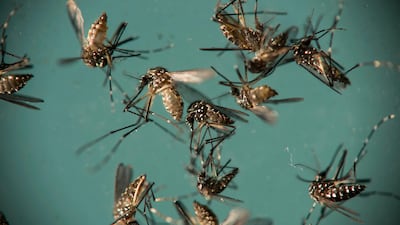A large mosquito factory, where about five billion insects will be biologically modified to help tackle disease, is to be built in South America.
After years of research, the World Mosquito Programme has launched a project aimed at inserting a specific bacteria into mosquitoes in Brazil to curb the spread of deadly viruses.
The initiative, using this naturally occurring disease control method, has proven to be effective in significantly reducing cases of dengue, Zika and chikungunya.
The $19 million bio-factory will be built in partnership with the Oswaldo Cruz Foundation (Fiocruz) and the WMP.
It will lead to the creation of a mosquito mass production centre, initially capable of producing up to 100 million mosquito eggs per week.
“For decades, Brazil and in particular, Fiocruz, has been a global leader in pioneering innovative, high-impact solutions to infectious diseases,” said Scott O’Neill, chief executive of the WMP.
“We are excited to work with Fiocruz, the Ministry of Health, and other government partners to scale our proven Wolbachia method across Brazil to provide an effective and affordable way to stop dengue, chikungunya and Zika — three diseases that have been unstoppable until now.”
How do modified mosquitoes slow infection rates?
The Wolbachia bacteria is naturally found in about half of all insects.
A common type of mosquito called Aedes aegypti, which can transmit viruses such as chikungunya and dengue when it bites people, does not normally carry Wolbachia.
But scientists discovered that once a mosquito becomes infected with Wolbachia, the bacteria outcompetes viruses, reducing the risk of deadly infections in humans.
Once modified mosquitoes, such as those to be cultivated at the WMP factory in Brazil, are released into areas infested with wild insect populations, the bacteria slowly spreads.
Brazil first released bacteria-infected mosquitoes in Rio de Janeiro in September 2014.
More of the insects were introduced across the country over the next three years.
The method is now thought to protect more than three million people from potentially deadly viruses, across three regions of the country.
The number of dengue cases has been reduced in those areas by 76 per cent, with chikungunya falling by 56 per cent and Zika infections by 37 per cent, the WMP said.
While a location for the mosquito biofactory has not yet been confirmed, it is expected to be operational by early next year.
“The idea is that we can immediately expand the current production and supply of mosquito eggs to the Ministry of Health, and state and municipal governments,” said Fiocruz president Mario Moreira.
“This will help control arboviruses in municipalities considered more critical and with higher transmission rates of dengue, Zika and chikungunya.”
Millions already protected
Research into the Wolbachia bacteria by scientists at Monash University in Melbourne, Australia, helped to develop the technology that prevents mosquitoes exposed to the bacteria passing on certain viruses.
It has already been introduced into 12 countries, protecting about 11 million people, with more nations set to benefit in the years ahead.
In the first three months of the year, 113 deaths were reported from dengue from 380,171 worldwide cases.
Figures compiled by the Pan American Health Organisation show there were 2.8 million cases of dengue in the Americas in 2022, 40,249 cases of Zika and 273,685 cases of chikungunya — a virus carried by mosquitoes that is rarely fatal, but can cause serious problems for those with diabetes, high blood pressure, young children and pregnant women.
Typically, dengue fever causes flu-like symptoms and lasts for up to a week. It usually occurs following an incubation period of 4-10 days after the bite of the infected mosquito.
In 2023, the majority of cases were found in Brazil, followed by Bolivia, Peru, Colombia and Nicaragua.


